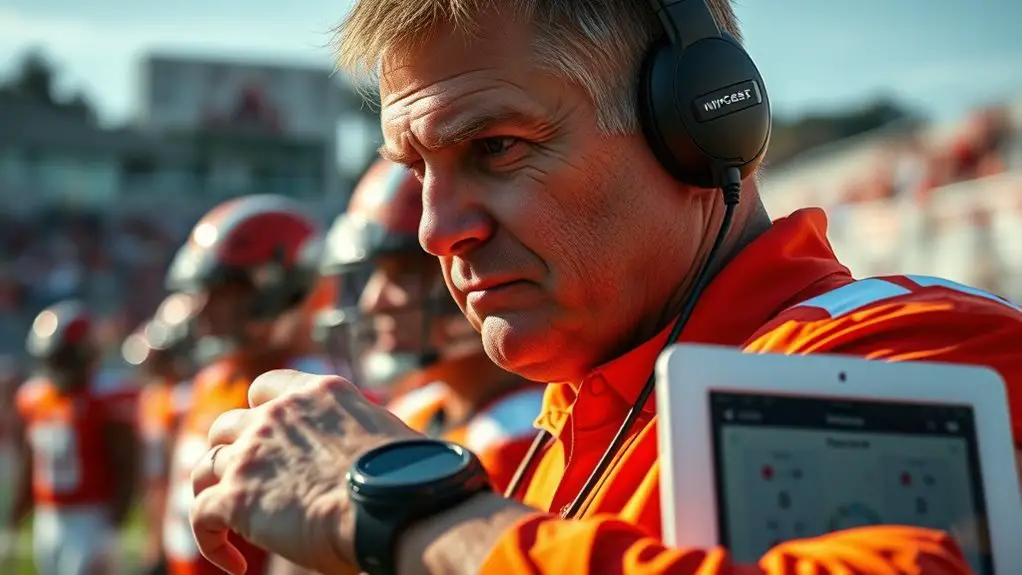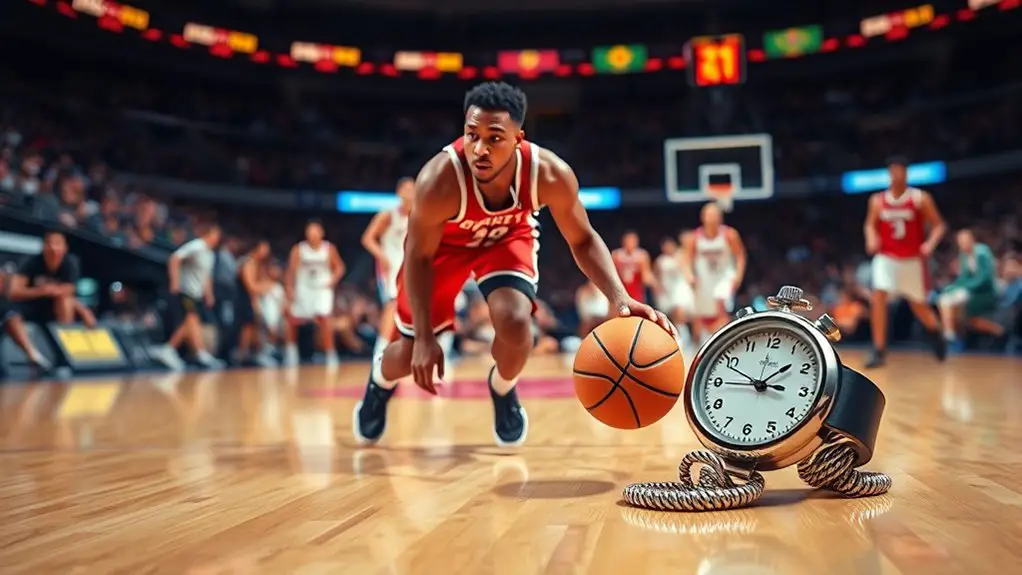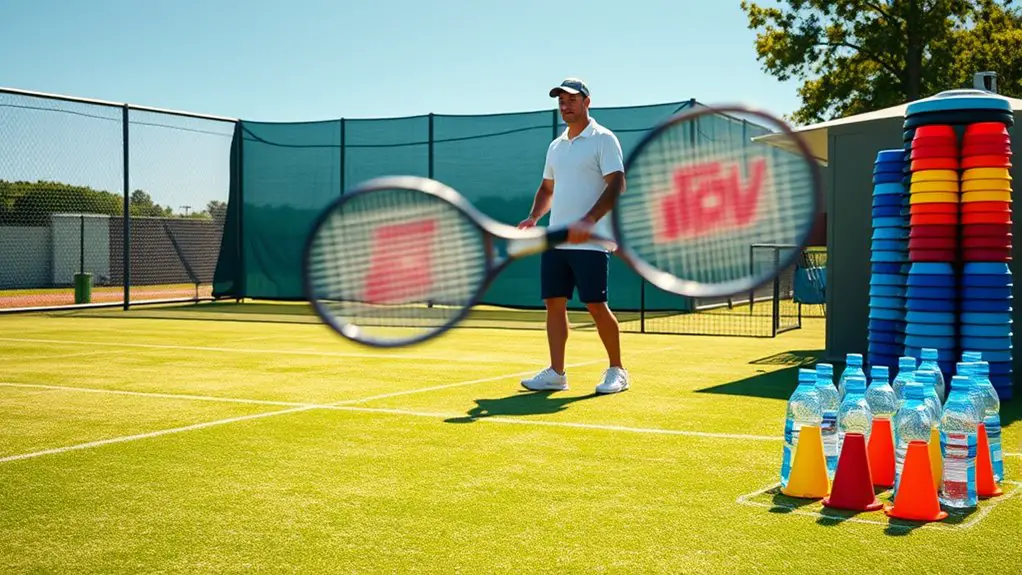To improve your reaction time for better play calling, focus on cognitive drills and physical exercises. Engage in pattern recognition and memory games to boost mental agility. Incorporate agility drills and reaction-based activities into your routine to sharpen your reflexes. Don't forget the importance of hydration, proper nutrition, and quality sleep for peak performance. Finally, effective team communication can enhance decision-making. Stick around to discover more techniques that can elevate your play-calling skills.
Understanding Reaction Time and Its Importance in Sports
Reaction time is a crucial element in sports, where split-second decisions can make the difference between victory and defeat. You know that every moment counts, and having sharp reaction time can elevate your sports performance. Whether you're on the field, court, or track, the ability to respond instantly to unpredictable situations is key. It's not just about physical speed; it's about mental agility, too. The importance of reaction time lies in your capacity to anticipate your opponent's moves and make quick decisions that can turn the tide of the game.
Improving your reaction time means you can seize opportunities and dodge potential pitfalls, granting you a sense of freedom in your gameplay. As you train your body and mind to react faster, you'll feel more in control and confident, allowing you to express your true potential. Physical exercises such as agility drills and reaction ball drills can significantly enhance your reflexes. Embrace the challenge—your journey to enhanced reaction time is your path to sports excellence!
The Science Behind Quick Decision-Making
When you're faced with a fast-paced game situation, your brain undergoes a remarkable process to make quick decisions. Neuroscience studies reveal that your brain's ability to process information rapidly hinges on minimizing cognitive load. The fewer distractions and unnecessary details you're juggling, the faster you can react. Your prefrontal cortex, responsible for decision-making, works tirelessly to sift through options, often relying on instinct and past experiences.
In high-pressure moments, your brain can tap into well-practiced patterns, allowing for swift responses. However, if you overload it with too much information or stress, you risk slowing down your reaction time. By understanding this science, you can train your mind to streamline decision-making, enabling you to stay agile on the field. Embracing this knowledge can empower you to cultivate a more instinctive and responsive play-calling style, ultimately enhancing your game performance. Additionally, incorporating mindfulness techniques into your training can further enhance your focus and decision-making speed during competitions.
Cognitive Drills to Enhance Mental Agility
To improve your mental agility on the field, incorporating cognitive drills into your training routine can make a significant difference. These exercises enhance cognitive flexibility and mental speed, allowing you to react faster during play calling. Here are a few drills you can try:
- Pattern Recognition: Use flashcards with different formations or plays and test your ability to identify them quickly. This helps sharpen your recognition skills under pressure.
- Dual-Task Exercises: While performing a familiar drill, add a cognitive task, like solving math problems. This boosts your mental capacity to multitask during games.
- Memory Games: Play games that challenge your memory, like Simon Says or matching pairs, to enhance your recall abilities on the field. Additionally, practicing visualization techniques can help mentally rehearse scenarios, making your reactions instinctive during high-pressure situations.
Physical Exercises to Boost Reflexes
While mental agility is essential, physical exercises play an equally important role in boosting your reflexes on the field. You need to combine fun and fitness to elevate your game. Agility drills, like ladder workouts or cone sprints, sharpen your quickness and improve your footwork. These exercises can help you navigate the field with speed and precision, giving you an edge over your opponents. Incorporating agility ladder drills into your training routine can further enhance your reflexes. Simple activities, like catching a ball thrown from different angles or using reaction lights, can help sharpen your response time. These games not only make practice more enjoyable but also mimic the unpredictable nature of gameplay.
Visualization Techniques for Faster Play Calling
Visualization techniques can greatly enhance your ability to make quick and effective play calls on the field. By employing various visualization methods, you can sharpen your mental imagery and boost your reaction time. Here are some techniques to reflect on:
- Scenario Practice: Picture different game situations and visualize your responses. Imagine the opposing team's formations and how you'd counter them.
- Positive Reinforcement: Visualize yourself making successful calls. This can build confidence and reduce hesitation in real-life situations.
- Focus on Details: Create vivid mental images of the players' movements and the field dynamics. This clarity helps you react more swiftly when it counts. Additionally, incorporating mindfulness in athletic performance can further enhance your ability to maintain focus during critical moments.
Incorporating Technology for Real-Time Feedback
Enhancing your play calling isn't just about mental imagery; incorporating technology can provide real-time feedback that sharpens your decision-making skills. By using wearable devices, you can access real-time metrics that track your performance and help you analyze your decisions on the fly. Imagine having feedback analysis at your fingertips during practice, guiding you through the nuances of play calling.
| Feature | Benefit |
|---|---|
| Wearable Devices | Track performance seamlessly |
| Interactive Simulations | Enhance decision support |
| Real-Time Metrics | Instant insights for improvement |
Utilizing these tools not only boosts your reaction time but also empowers you to make informed choices under pressure. Performance tracking transforms your understanding of the game, allowing you to adapt and thrive. With technology at your side, you're free to elevate your skills and take control of your play calling like never before. Incorporating smart wearables into your training can further enhance your ability to make quick decisions during gameplay.
The Role of Team Communication in Decision-Making
Effective team communication is essential for quick decision-making during high-pressure situations, as it guarantees that everyone is on the same page. When you foster strong team dynamics, your ability to make swift calls improves greatly. Implementing effective communication strategies can enhance your team's responsiveness and cohesion.
- Establish clear roles: Confirm everyone knows their responsibilities to minimize confusion during critical moments.
- Encourage open dialogue: Create an environment where team members feel free to share ideas and feedback without fear of judgment.
- Utilize non-verbal cues: Develop signals or gestures that can convey messages quickly, saving precious seconds when time is of the essence. Additionally, fostering strong support systems within the team can significantly boost motivation and performance.
Simulating Game Scenarios for Practice
While you might think that practice only happens during scheduled training sessions, simulating game scenarios can be a game-changer for your team's reaction time in real situations. By creating practice scenarios that mimic actual game situations, you're allowing your players to think on their feet and respond quickly under pressure. This not only sharpens their instincts but also builds confidence in their abilities. Incorporating positive self-talk during these simulations can further enhance their performance under pressure.
Here's a breakdown of effective simulation types:
| Simulation Type | Purpose |
|---|---|
| Time-Restricted Plays | Enhances quick decision-making |
| Scrimmage with Obstacles | Improves adaptability |
| Scenario Role-Playing | Boosts situational awareness |
| Pressure Situations | Builds mental resilience |
| Game Tape Analysis | Identifies improvement areas |
Integrating these simulations into your training can greatly enhance your team's ability to react swiftly when it matters most. Embrace the freedom of creativity in your practice!
Nutrition and Rest for Optimal Performance
Nutrition and rest are the backbone of peak performance for athletes. To improve your reaction time for better play calling, you need to focus on smart nutrition strategies and proper recovery. Here's how to optimize your approach:
- Hydration Importance: Stay hydrated before, during, and after games to keep your mind sharp and your body energized. Proper hydration supports the freedom to perform at one's best.
- Meal Timing: Plan your pre-game meals to include carbs and proteins, fueling your performance. Post-game nutrition is vital for recovery, so don't skip it!
- Sleep Optimization: Aim for quality sleep, as it enhances your focus and decision-making speed.
Implementing these recovery protocols will guarantee you're not just physically ready but mentally agile. Remember, nutrient timing can make a significant difference in how you feel and perform. Prioritize these aspects, and you'll see improvements in your play calling and overall game performance.
Monitoring Progress and Adjusting Techniques
To enhance your reaction time for play calling, consistently monitoring your progress is essential. Start by setting clear benchmarks to track your improvements. Use tools like apps or journals to record your reaction times during drills or practice scenarios. This progress tracking helps you see where you excel and where you need to focus your efforts.
As you gather data, don't hesitate to make technique adjustments. Maybe you'll find that a specific drill isn't yielding results, or perhaps you need to tweak your approach for better efficiency. Stay flexible and willing to experiment—freedom in your training allows for creativity and innovation.
Regularly review your progress and adjust your techniques to keep pushing boundaries. By actively engaging in this process, you'll cultivate a sharper reaction time and elevate your play calling game to new heights. Embrace the journey and let your evolution shape your success.
Frequently Asked Questions
How Does Age Impact Reaction Time in Athletes?
Age can notably impact reaction time in athletes. As you age, the aging process often leads to cognitive decline, affecting decision-making speed and motor skills. For youth athletes, their bodies adapt quickly to training, enhancing their reaction times. However, as you get older, those training adaptations may not be as effective. It's important to stay active and engaged, but you might notice slower responses compared to your younger counterparts.
Are There Specific Diets That Can Enhance Reaction Time?
Eating to boost your reaction time is like tuning a race car for peak performance. You'll want to focus on nutrient timing, fueling your body with the right foods before and after activities. Incorporate complex carbs and lean proteins for sustained energy. Don't forget hydration strategies—staying properly hydrated keeps your brain sharp and responsive. By choosing the right diet, you're giving yourself the freedom to react quickly and effectively in any situation.
Can Video Games Improve Reaction Times for Sports?
Absolutely, video gaming can enhance your reaction times for sports. Engaging in fast-paced games not only sharpens your reflexes but also boosts cognitive training, improving your decision-making skills under pressure. As you play, you'll find yourself reacting quicker to stimuli, which translates well onto the field or court. So, if you're looking for a fun and effective way to gain an edge, embracing video gaming might just be your ticket to freedom in performance!
What Role Does Sleep Play in Reaction Time?
Sleep plays an essential role in your reaction time. If you're not getting enough quality sleep, your cognitive functions can suffer, impacting your ability to respond quickly. Maintaining healthy circadian rhythms helps regulate your sleep, ensuring you wake up refreshed and alert. When you prioritize solid sleep, you'll notice improvements in your focus and speed, allowing you to perform at your best. So, embrace good sleep habits for that freedom to react swiftly!
How Can Mindfulness Practices Aid in Quick Decision-Making?
Imagine standing at the edge of a cliff, feeling the wind rush by, or sitting quietly by a serene lake. Mindfulness exercises can ground you, helping you connect with the present moment. Focused breathing, where you inhale deeply and exhale slowly, centers your thoughts and calms your mind. By practicing these techniques regularly, you'll enhance your ability to make quick decisions, allowing you to embrace freedom and spontaneity in life's unpredictable moments.




